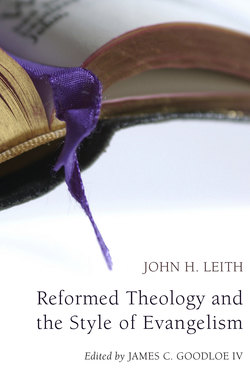Читать книгу Reformed Theology and the Style of Evangelism (Stapled Booklet) - John H. Leith - Страница 4
На сайте Литреса книга снята с продажи.
Reformed Theology and the Style of Evangelism
ОглавлениеThe responsibility to bear witness to the gracious presence of God in Jesus Christ “in Jerusalem and in all Judea and Samaria and to the end of the earth” has been the perennial task of the Christian community from the beginning. But the style and form of evangelism has varied according to time and place. There is no one way of evangelism, as the history of Christians witnessing and confessing their faith makes very clear. The life of the Christian community has been and is enriched by a variety of evangelistic styles and by multiple theological confessions.
There is, however, a limit to possible Christian theologies, and the preeminent theological task of the church is to test its proclamation by the word of God in Jesus Christ, as attested in scripture, to see that it is within the boundary. There is also a limit to the legitimate styles of evangelism. Some styles of evangelism corrupt and others strengthen the witness, but more significantly, style always betrays the real content. “There is an intimate but seldom seen connection between a person’s thought and his style, which Alfred North Whitehead defined precisely as the ‘ultimate morality of mind.’”1
The purpose of this paper is to relate Reformed theology to the form and style of evangelism. The paper presupposes that evangelism as shaped by Reformed theology is a valid and effective form of evangelism, but it does not presuppose that such form of evangelism is the only form that has validity or effectiveness. It is hoped that the proposal will be the occasion for self-criticism in the work of evangelism and for renewal of theological and ecclesiastical life in the Reformed tradition.
I
Reformed theology has never been precisely defined, and its boundaries are uncertain. There is no one normative Reformed theology. Here the term is taken in a general sense to indicate the theological perspective that had its origin with Zwingli, Bullinger, and Calvin in sixteenth-century Switzerland and that has been maintained by such theologians as William Ames and Turretin in the seventeenth century, by Edwards in the eighteenth, by Hodge in the nineteenth, and by Karl Barth and Emil Brunner in the twentieth. In order to sharpen its focus, this paper is based specifically on the theological works of Calvin. The most distinguishing characteristics and emphases of classic Reformed theology as embodied in the theology of Calvin were:
1. The lordship and sovereignty of God,
2. History as the working out of the purposes of God,
3. Simplicity in style,
4. The importance of theological knowledge and understanding,
5. The Christian life as the embodiment of the purposes of God and conformity to his will, and
6. The importance of church organization.
Each of these emphases influences the form and shape of evangelism.
The Lordship of God. For Calvin the most important fact is God, and the most important task is the honor and service of God. This is the important truth that older churchmen tried to convey in that strange question alleged to have been put to candidates for the ministry: Are you willing to be damned for the glory of God? However one may judge the merits of the question, it clearly indicated that something is more important than the salvation of one’s soul. The question exposed the self-centeredness of those whose own righteousness is too precious and who are excessively concerned with the salvation of their souls. The question also suggests there is something good about the cautious piety of those who seek to do God’s will and leave the salvation of their souls to him.
Karl Barth, the great Reformed theologian of the twentieth century, comments that in the theology of Tholuck, a German revival theologian of the nineteenth century, “the religious individual cannot be more important, all the rest cannot be more shapeless, biography cannot replace theology more emphatically, the Christian cause cannot be more thoroughly taken up into the person of the Christian man.”2 For this reason, Barth goes on to say, revival theology can never be great theology. It is too absorbed with the state of the human soul and too little involved with the great reality of God. Revival theology is too eager to report the anatomy of feeling—or the state of the soul—to be able to proclaim adequately the might act of God.
The New Testament scholar, E. C. Colwell, recently observed that in the New Testament,
We have so little from Jesus about Jesus. He lost Himself in devotion to God. Long before his execution on the cross, he lost his life. Thus be became—to our bafflement—an incarnation of the saying “He who would save his life must lose it.”
He talked about our obligation to love God, not about God’s love for us. The First Commandment is the central focus of his teaching. And because he had integrity, he talked about that and the second, derivative commandment and not about himself. Love of God came first; love of neighbor followed.
Because of the consistency of this priority in his message, it is difficult to cast his mantle over the current exhortation to find yourself first. The pagan Greeks had a word for it (Gnothi seauton), but the good news of Jesus Christ does not. The Gnostics rejoiced in finding themselves, but the majority of Christians would have none of it as the prime quest. For them, as for their Lord, the primal quest was to find God.3
